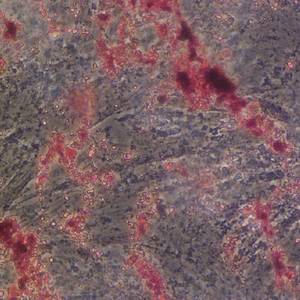 Smart Citations
Smart CitationsSee how this article has been cited at scite.ai
scite shows how a scientific paper has been cited by providing the context of the citation, a classification describing whether it supports, mentions, or contrasts the cited claim, and a label indicating in which section the citation was made.
Adipose-derived stem cells promote the recovery of intestinal barrier function by inhibiting the p38 MAPK signaling pathway
Intestinal barrier damage causes an imbalance in the intestinal flora and microbial environment, promoting a variety of gastrointestinal diseases. This study aimed to explore the mechanism by which adipose-derived stem cells (ADSCs) repair intestinal barrier damage. The human colon adenocarcinoma cell line Caco-2 and rats were treated with lipopolysaccharide (LPS) to establish in vitro and in vivo models, respectively, of intestinal barrier damage. The expression of inflammatory cytokines (TNF-α, HMGB1, IL-1β and IL-6), antioxidant enzymes (iNOS, SOD and CAT), and oxidative products (MDA and 8-iso-PGF2α) was detected using ELISA kits and related reagent kits. Apoptosis-related proteins (Bcl-2, Bax, Caspase-3 and Caspase-9), tight junction proteins (ZO-1, Occludin, E-cadherin, and Claudin-1) and p38 MAPK pathway-associated protein were detected by Western blotting. In addition, cell viability and apoptosis was determined by a CCK-8 kit and flow cytometry, respectively. Cell permeability was assayed by the transepithelial electrical resistance value and FITC-dextran concentration. The homing effect of ADSCs was detected by fluorescence labeling, and intestinal barrier tissue was observed by HE staining. After ADSC treatment, the level of phosphorylated p38 MAPK protein decreased, the expression of inflammatory factors, oxidative stress and cell apoptosis decreased, the expression of tight junction proteins increased, and cell permeability decreased in Caco-2 cells stimulated with LPS. In rats, ADSCs are directionally recruited to damaged intestinal tissue. ADSCs significantly decreased the levels of D-lactate, diamine oxidase (DAO) and FITC-dextran induced by LPS. ADSCs promoted tight junction proteins and inhibited oxidative stress in intestinal tissue. These effects were reversed after the use of a p38 MAPK activator. ADSCs can be directionally recruited to intestinal tissue, upregulate tight junction proteins, and reduce apoptosis and oxidative stress by inhibiting the p38MAPK signaling pathway. This study provides novel insights into the treatment of intestinal injury.
Downloads
Publication Facts
Reviewer profiles N/A
Author statements
- Academic society
- N/A
- Publisher
- PAGEPress Publications, Pavia, Italy
Ethics Approval
this study was approved by the Animal Ethics Committee of Kunming Medical University Animal CenterSupporting Agencies
Yunnan Provincial Science and Technology Plan ProjectHow to Cite

This work is licensed under a Creative Commons Attribution-NonCommercial 4.0 International License.
PAGEPress has chosen to apply the Creative Commons Attribution NonCommercial 4.0 International License (CC BY-NC 4.0) to all manuscripts to be published.

 https://doi.org/10.4081/ejh.2025.4158
https://doi.org/10.4081/ejh.2025.4158






